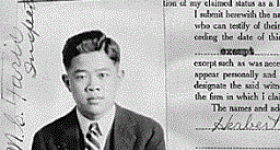A version of this article was first published at the Center for American Progress.
“Justice delayed is justice denied.” – William Gladstone, former British prime minister
On October 6 the US Senate took a step [to acknowledge
history’s ills] by passing SR 201 and moving it to the House. The resolution,
sponsored by Sens. Dianne Feinstein (D-CA) and Scott Brown (R-MA), expresses
regret for the Chinese Exclusion Act of 1882 and the six decades of
anti-Chinese American persecution that followed. It also reaffirms America’s
commitment to protecting civil rights.
Many other discriminatory immigration laws were passed
before and after this one. But it is the focal point of this resolution due to
its historical significance. It was the first major law restricting immigration
in the United States, and the first legislation passed by Congress that overtly
banned people based on "race" (rather than inventing
"moral" grounds).
Though the first Asian immigrants arrived here during the
1700s, the first major wave of Chinese immigrants came to America shortly after
gold was discovered in California in the mid-19th century. They were initially
welcomed into the country and settled on the West Coast along with thousands of
other migrants seeking a better life and their version of the American Dream.
When gold became scarcer, many Chinese immigrants turned to more stable labor
both in agricultural plantations and what history remembers them most for -- helping
build the Transcontinental Railroad.
Once job prospects dimmed, however, these immigrants became
scapegoats for the economic hardships that emerged in the late 1800s. As the
post-Reconstruction South saw the establishment of Jim Crow laws and increased
acts of discrimination against African Americans, a similar movement in the
West targeted Chinese Americans.
Ethnic Chinese Americans were singled out to pay taxes in
order to work, commute, and even occupy space to discourage the “coolies,” as
they were derogatorily called, from immigrating or residing in certain
communities. State and local governments throughout the West imposed laws
barring Chinese Americans from owning property, marrying whites, holding
certain jobs, or from testifying against whites in court.
The 1882 Exclusion Act and its successors not only limited
Chinese Americans’ rights and denied them citizenship, but also validated
inhumane attitudes that Chinese Americans were not viable as social equals.
During this period the highest levels of government provided
credence to such prejudice, as even U.S. President Grover Cleveland declared
people of Chinese descent to be “an element ignorant of our constitution and
laws, impossible of assimilation with our people and dangerous to our peace and
welfare.”
As Rep. Judy Chu (D-CA) explained when introducing the
Chinese Exclusion Act resolution in the House in May, the law “engendered hatred,
bigotry and prejudice in the minds of Americans towards Chinese,” which
resulted in many being “brutally murdered and even more were abused, harassed
and detained.”
These discriminatory attitudes would manifest into more
large-scale violence in the form of anti-Chinese American riots, forced
expulsions of entire Chinese American communities, and even mass murder, most
notably the Rock Springs Massacre of 1885, when 28 Chinese American miners were
beaten to death and countless others injured.
Even though the law was repealed in 1943, it was due not to any
moral clarity by lawmakers, but to America’s entry into World War II. The
United States sought to repair relations with China, then a critical ally in
the war.
Proponents of the resolution wish to see the government
officially acknowledge that the law was unjust and recognize the suffering that
thousands of Chinese Americans and Asian Americans faced as a result of the
anti-Chinese American atmosphere it fomented.
The resolution unanimously passed by voice vote in the
Senate, but the House version introduced by Reps. Chu, Judy Biggert (R-IL), and
Mike Coughlin (R-CO) faces hurdles, as Speaker John Boehner (R-OH) refuses to
bring it up for a vote.
As the last living generation directly affected by the
exclusion laws begins to pass away, it is imperative that the House of
Representatives follows the lead of the Senate and passes this resolution now,
to make sure that the victims get the closure they deserve and that our country
lives up to its ideals.
Justice has been denied to these victims for too long.
Speaker Boehner and the rest of the House should not delay it any further.
* * *
Nick Lepham is a Special Assistant at American Progress.









Comments